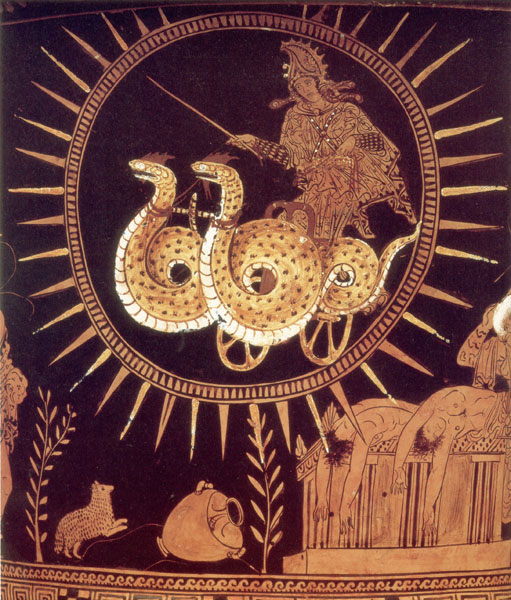return to Home Page
or move on to Goddess Mehurt, next chronologically,
or use Her Cyclopedia Index
Medea, Cunning-One.
M]DA1
[to Whom the nineteenth day of September, day 262, is dedicated]

return to Home Page
or move on to Goddess Mehurt, next chronologically,
or use Her Cyclopedia Index
Medea, Cunning-One.
M]DA1
[to Whom the nineteenth day of September, day 262, is dedicated]

Geography/Culture: Pelasgian. Corinthian Greek.
Linguistic Note: Graves gives 'cunning' as the meaning of Medea. He may be thinking of mu-eta-delta-epsilon-alpha, (medea), which I find defined as 'counsels, plans, arts, schemes', though there's also mu-eta-delta-epsilon-alpha, (medea), 'the genitals'. However Rose says the Greek form of Her name is mu-eta-delta-epsilon-iota-alpha, (medeia), for which I can find no definition, though mu-eta-delta-epsilon, (mede-), is a negative. mu-epsilong-delta-epsilon-omega-nu, (medeon), and similar words mean 'guardian'; mu-eta-delta-iota-sigma, (medis), is a Median woman (ie from Media, a country in Asia). Medea is the Roman transliteration of the Greek. According to Briffault, (M 104), the name Medea and the word medicine share the same root with the meaning knowledge or wisdom. Skeats somewhat supports this with the observation, under medicine, that Fick (i. 714) compares also Zend. Madha, medical science. Related English words: {pehaps} medic,'a kind of clover'; {perhaps} medicine, and its derivatives.
Description: Goddess of the sun and moon; Goddess; Queen; Witch; Herbalist; Divine Sorceress of illumination, transformation and re-birth; Matron of divination; Revenger of rejection; child Destroyer; Eponymous Ancestress of the Medians; Mistress of Aia, 'Land' (Colchis); She Who speaks sagely through a deathless mouth
.
In Her story, Her divine mythical reality has been personalized and negativized. The declining matriarchy is devalued by the patriarchal principle.
To Whom Sacred: yellow flowers (they grew from Prometheus' blood in the Caucasus); from these She distilled the drug which made Jason invulnerable to fire and iron for twenty-four hours); aconite (the poison with which She intended to kill Theseus); juniper (with drops of which, and incantations, She drugged the serpent guardian of the Golden Fleece); snake; ram; cauldron of rebirth and illumination (in which, by boiling She restores animals' and peoples' youth); basin of water mirroring the sun (used for divination); winged chariot (drawn by snakes, or dragons); the number fourteen; the Golden Fleece.
Festival: annual sacrifice of fourteen children.
Male Associates: consort and deserter, Jason, Healer; sons: Mermeros and Pheres, killed either by Herself or by the Corinthians. In the Corinthian story, Her sons' vengeful ghosts destroyed Corinthian children until rites were instituted to appease them {this may refer to the child-sacrifice, see above, as may the fact that some sources say She bore Jason fourteen children}. Son, Medus, variant Medos, who became the eponym of the Medes. {Who he was fathered by is uncertain.} Consort (after She was deserted by Jason), Ægeus, ----, of Athens. She attempted to kill his son Theseus. Consort in Elysium, Achilles, Lipless. In Crete She killed Talus, Sun, (variant Talos), the man of bronze, by Her sorcery.
Medeia.
Geography/Culture: Italy, Oscan tribe. She is honoured particularly in the Marsian distict.
Linguistic Note: Related English word: {perhaps} angina, from Latin ang-ere, 'to choke, strangle'.
Description: Banished from Athens, after attempting to poison Theseus, it is said that upon Her arrival in Italy Medea, Cunning-One, was welcomed and recognized as Angitia, {Strangler}, Goddess of healing and witchcraft; Great Expert in verbal and herbal spells; She Who taught snake-charming to the Marrubians.
To Whom Sacred: snake.